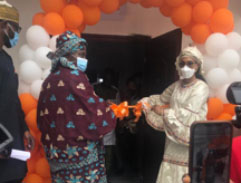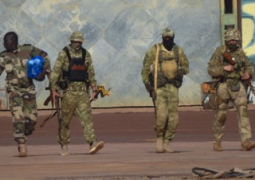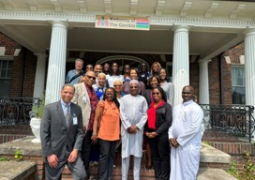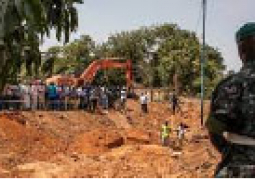
The initiative - Reusable Menstrual Pad Center established by UNFPA in partnership with the Ministry of Gender, Children and Social Welfare, and Network against Gender-Based Violence (NGBV) as part of its effort to ensure adolescent girls are given a better livelihood. It is funded from the United Nations Secretary General’s Peacebuilding Fund.
The reusable sanitary pad production center is established to create economic livelihood for women, promote the use of climate-friendly products and reduce dependency on natural resources through income diversification and climate friendly solutions.
The pad center seeks to ensure the availability of reusable sanitary pads for adolescent girls to ensure school attendance, improved sexual reproductive health, reduced economic burden, and reduced environmental impact of the disposable pads.
The first lady in her inauguration statement said the reusable menstrual pad will not only serve the people of Basse but the entire country. She described menstrual health hygiene management (MHHM) as one among several challenges that adolescent girls’ face, thus limiting them from achieving equitable education opportunities.
She added that in low-and middle-income countries, practicing good menstrual hygiene is a difficult task for women and girls due to various reasons.
Madam Bah-Barrow further said that the establishment of the reusable menstrual pad production center will not only reduce the use of plastic waste that hinders our environment but also give women and girls a fair chance to use quality reusable sanitary materials during their menstrual period.
Kunle Adeniyi, UNFPA-The Gambia Country Representative, said the center would provide women the opportunity to access skills that will empower them economically through the production of reusable menstrual pads for adolescent girls, ensure access to information and skills that will strengthen the community peace architecture and foster social cohesion.
He added that empowering women and girls to take control and make decisions over their bodies and their lives will ensure the attainment of universal sexual and reproductive health and rights and gender equality.
According to him, in many countries around the world including The Gambia, women, girls and people who menstruate cannot afford to buy or do not have reliable access to the safe menstrual products they need and are often forced to use improvised materials to manage their periods, including rags which most times pose serious health risks to them.
“Lack of access to menstrual products has both short and long-term repercussions for women and girls. Period poverty, including the stigma that often surrounds menstruation, often prevents young women and girls from going to school or work, leading them to miss out on their education or vital income to support themselves and their families,” he stated, adding that the disruption in their access to education as a result of pad poverty can have long term devastating impact on a girl’s life, including her exposure to child marriage, early pregnancy and vulnerability to violence and abuse.
Mr. Adeniyi further said that when girls have the power to make decisions over their bodies and their lives, we can achieve universal sexual and reproductive health and rights and gender equality.
Fatou Kinteh, minister of Gender, Children and Social Welfare, said the project would contribute towards poverty alleviation, adding that when women are economically empowered, their socio economic status is improved, and this leads to their social and political empowerment.
Fallu Sowe, national coordinator of Network Against Gender-Based Violence, said the center is essential due to the increased need to make menstrual pads accessible to women and girls in rural Gambia. He added that women and girls in rural and hard to reach communities face many challenges managing menstruation due to limited access to quality menstrual pads, limited and inaccurate information about menstruation and the physiological changes associated with puberty.
Fifteen women from communities in Upper River Region are currently undergoing a-three-month training for the production of the reusable menstrual pads. During the period, they are expected to produce 5, 000 reusable pads.
Read Other Articles In Headlines





